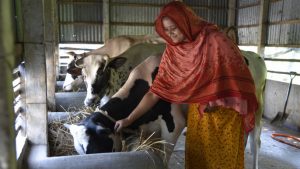The Royal Association of British Dairy Farmers’ (RABDF) event at Stoneleigh Park, Warwickshire, on 5 February has become a key date in the farming calendar.
Event details
Date: Wednesday 5 February
Time: 8am-5:30pm
Venue: Stoneleigh Park, Warwickshire CV8 2LZ
Tickets: Free for RABDF members and under-16s with proof of age. Prices for non-members are £17 when booked in advance at dairy-tech.uk or £20 at the gate. Concessions are available for students.
Contact: office@rabdf.co.uk or 02476 639 317
RABDF managing director Matt Knight said feedback from last year’s 6,000 visitors showed that 90% planned to return in 2020.
Mr Knight says the event, specifically devised to focus on innovation, technology and new concepts, has already attracted more than 300 exhibitors, 76 speakers and 55 new products to this year’s show.
The aim is to help make UK dairy businesses mores sustainable and competitive by showcasing new thinking and ideas, he explains.
As well as ground-breaking concepts such as the use of satellite mapping, biological solutions to reduce emissions and robots, visitors will be able to hear from experts on a range of topics including: environmental issues, obtaining net zero, the nutritional value of milk and dairy vision for 2030.
Dairy-Tech is divided into four key areas:
1 Science, technology and innovation Hall 1, hosts the Innovation Hub – a short presentation seminar packed full of dynamic and tech-focused speakers
2 Business efficiencies Hall 2, includes the Dairy Hub – with high-profile speakers on key topics
3 Practical Hall 3, includes the Skills Studio – the one-stop-shop for students and new entrants and those looking to develop their skills
4 Machinery and innovation hall – new for 2020, showcases the latest tractors and kit available along with live demonstrations including foot-trimming and thermal imaging.
Hub must-sees
Sessions across both hubs will aim to answer questions on how innovation and artificial intelligence will contribute to dairy businesses in the future, what best practice can do to reduce slurry emissions, the role of genetics in health and sustainability, and the key drivers for efficiency.
Dairy Hub
The Dairy Hub will offer advice, political insight, guidance, knowledge and take-home messages for current on-farm issues.
Cumbria farmer Robert Craig and Dave Craven from Grosvenor Farms will debate the pros and cons of low- versus high-input systems.
The dairy farmers – Mr Craig, a grass-based milk producer, and Mr Craven, a higher input, high genetic breeding, proponent – will also highlight the green credentials of their systems and what measures they have undertaken to reduce carbon emissions.
Sessions start at 9am.
Innovation Hub
The Innovation Hub covers a huge range of front-line issues with advances in nutrition, improving fertiliser use and a look at upcoming technical innovations.
One of the key innovations on show is Rezatec’s satellite-based grass management system. Grass SAT monitors more than 20 different datasets, including weather, soil, satellite information and management inputs.
The program makes 100s of complex calculations many times a day, to provide valuable information on soil properties, grass characteristics grass growth rates and the wedge available in kg/ha of dry matter.
Sessions start at 9:30am.
Skills must-sees
After a popular launch last year, the Skills Studio returns to Hall 3 in 2020.
The studio is a one-stop-shop for students, new entrants and anyone looking to develop their skills.
It will feature a CV clinic, an interactive jobs board, an in-depth look into apprenticeships and presentations of prestigious RABDF student awards.
There will be a Q&A with the Cream Awards Young Farmer finalists, business planning and succession planning sessions, as well as a student competition with a cash prize.
Sessions start at 9am.
Animal health must-sees
Workshops
New for this year is a series of animal health workshops, sponsored by Boehringer Ingelheim.
Experts will cover TB, calf health and mastitis.
Sarah Tomlinson, technical board director at the TB Advisory Service, will focus on how a dairy farm is affected by a TB breakdown.













